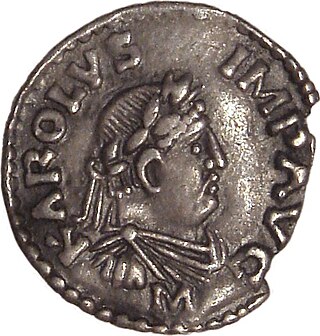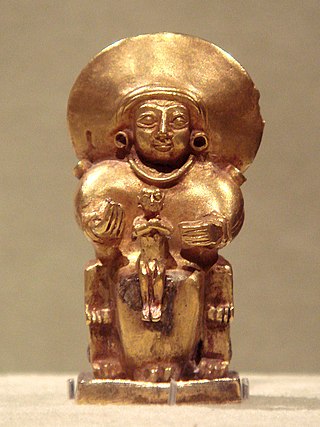
Charlemagne was King of the Franks from 768, King of the Lombards from 774, and Emperor of what is now known as the Carolingian Empire from 800, holding these titles until his death in 814. He united most of Western and Central Europe, and was the first recognised emperor to rule from the west after the fall of the Western Roman Empire approximately three centuries earlier. Charlemagne's reign was marked by political and social changes that had lasting influence on Europe throughout the Middle Ages.

The Lombards or Longobards were a Germanic people who conquered most of the Italian Peninsula between 568 and 774.

Theodelinda also spelled Theudelinde, was a queen of the Lombards by marriage to two consecutive Lombard rulers, Autari and then Agilulf, and regent of Lombardia during the minority of her son Adaloald, and co-regent when he reached majority, from 616 to 626. For well over thirty years, she exercised influence across the Lombard realm, which comprised most of Italy between the Apennines and the Alps. Born a Frankish Catholic, she convinced her first spouse Autari to convert from pagan beliefs to Christianity.

Carloman I, German Karlmann, Karlomann, was king of the Franks from 768 until his death in 771. He was the second surviving son of Pepin the Short and Bertrada of Laon and was a younger brother of Charlemagne. His death allowed Charlemagne to take all of Francia.

Desiderius, also known as Daufer or Dauferius, was king of the Lombards in northern Italy, ruling from 756 to 774. The Frankish king of renown, Charlemagne, married Desiderius's daughter and subsequently conquered his realm. Desiderius is remembered for this connection to Charlemagne and for being the last Lombard ruler to exercise regional kingship.

The siege or battle of Pavia was fought in 773–774 in northern Italy, near Ticinum, and resulted in the victory of the Franks under Charlemagne against the Lombards under King Desiderius.

Rodulf was king of the Heruli kingdom on the Middle Danube in the period around 500, and possibly of Scandinavian origin. He died in a battle in about 508, with the neighbouring Lombards, which led to the splitting up of the Heruli. He is probably the same Heruli king that Theoderic the Great wrote to in two surviving letters which do not mention his name, in one of which Theoderic "adopted" him with a gift of arms. Less certainly, many scholars also equate him to the King Rodulf that Jordanes mentions as having come from Scandinavia to Italy, to join Theoderic.

Hildegard was a Frankish queen and the wife of Charlemagne from c. 771 until her death. Hildegard was a noblewoman of Frankish and Alemannian heritage. Through eleven years of marriage with Charlemagne, Hildegard helped share in his rule as well as having nine children with him, including the kings Charles the Younger and Pepin of Italy and the emperor Louis the Pious.

This is a chronology of warfare between the Romans and various Germanic peoples. The nature of these wars varied through time between Roman conquest, Germanic uprisings, later Germanic invasions of the Western Roman Empire that started in the late second century BC, and more. The series of conflicts was one factor which led to the ultimate downfall of the Western Roman Empire in particular and ancient Rome in general in 476.

Authari was king of the Lombards from 584 to his death. He was considered as the first Lombard king to have adopted some level of Romanitas (Roman-ness) and introduced policies that led to drastic changes, particularly in the treatment of the Romans and greater tolerance for the Christian faith.

Menia was the queen of the Thuringians by marriage and the earliest named ancestor of the Gausian dynasty of the Lombards. She became a legendary figure after her death, strongly associated with gold and wealth.

Rudolf Kirchschläger, GColIH was an Austrian diplomat, politician and judge. From 1974 to 1986, he served as the president of Austria.

Liutprand was the king of the Lombards from 712 to 744 and is chiefly remembered for his multiple phases of law-giving, in fifteen separate sessions from 713 to 735 inclusive, and his long reign, which brought him into a series of conflicts, mostly successful, with most of Italy. He is often regarded as the most successful Lombard monarch, notable for the Donation of Sutri in 728, which was the first accolade of sovereign territory to the Papacy.

The Origo Gentis Langobardorum is a short, 7th-century AD Latin account offering a founding myth of the Longobard people. The first part describes the origin and naming of the Lombards, the following text more resembles a king-list, up until the rule of Perctarit (672–688).

Angelika Kirchschlager is an Austrian mezzo-soprano opera and lieder singer.

Ansa was a noblewoman who became the Queen of the Lombards in 756 and reigned until their fall to the Franks in 774 AD. She, like other Medieval Queens at the time, played a significant role in the stability and preservation of the later Lombard Kingdom, particularly through her religious contributions, donations, and political relationships with neighboring Kingdoms. She reigned alongside her husband, King Desiderius, in Northern Italy. She lived her final years exiled to a monastery until her death.
Garibald I was Duke of Bavaria from 555 until 591. He was the head of the Agilolfings, and the ancestor of the Bavarian dynasty that ruled the Kingdom of the Lombards.
Bisinus was the king of Thuringia in the 5th century AD or around 500. He is the earliest historically attested ruler of the Thuringians. Almost nothing more about him can be said with certainty, including whether all the variations on his name in the sources refer to one or two different persons. His name is given as Bysinus, Bessinus or Bissinus in Frankish sources, and as Pissa, Pisen, Fisud or Fisut in Lombard ones.
Elisabeth Wiese was a German serial killer from Hamburg, convicted and executed for the killing of five children.

The Sun goddess of Arinna, also sometimes identified as Arinniti or as Wuru(n)šemu, is the chief Goddess of Hittite mythology. Her companion is the weather god Tarḫunna. She protected the Hittite kingdom and was called the "Queen of all lands." Her cult centre was the sacred city of Arinna.
















